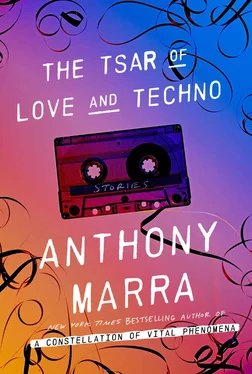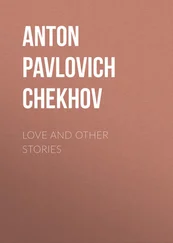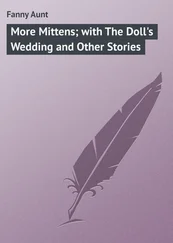“My question precisely! Apparently his wife, Galina Something-or-other-ova, the actress, has heard of this art museum you’ve cobbled together. What’ve you been up to?”
“It’s a long story, sir.”
“You know I hate stories.”
“Yes, sir.”
“Well, do show him our famed Chechen hospitality. Be sure to offer him a glass of unboiled tap water. Let’s give the thirteenth richest man in Russia an intestinal parasite!”
“Don’t worry, sir. I’m a limo driver.”
“I’ll land on my feet, Ruslan. Don’t lose too much sleep over my future. Perhaps I’ll visit America. I’d like to see Muskegon while I’m still young and healthy enough to really experience it.”
THREE weeks pass and here he is, Oleg Voronov sitting in the backseat of the Mercedes with his wife, the actress Galina Ivanova. Up front is his assistant, a bleached-blond parcel of productivity who takes notes even when no one is speaking. But try as I might, I’m unable to properly hate Voronov. So far he’s been untalkative, inattentive, and uncurious; in short, a perfect tourist. Galina, on the other hand, has read Khassan Geshilov’s The Origins of Chechen Civilization and recites historical trivia unfamiliar to me. The office doors of dead administrators clatter beneath us and she asks thoughtful questions, treating me not as a servant, or even a tour guide, but as a scholar. I casually mention the land mines, the street children, the rape and torture and indiscriminate suffering, but Voronov and his wife shake their heads with sympathy. Nothing I say will turn them into the masks of evil I want them to be.
The tour concludes at my flat. I’m hesitant to allow a man of his stature into the small world of my museum, but his wife insists. As we ascend the stairwell, Voronov checks his watch, a cheap plastic piece of crap, and in that moment I know I will not hate him as he deserves to be hated.
“This is what remains of the Grozny Museum of Regional Art,” I say as I open the door. Voronov and his assistant circle the room. I glance to the kitchen sink, but a glass of unboiled tap water is a fate I wouldn’t wish upon even a Russian oligarch.
Voronov and Galina pass the burned-out frames to the pasture painting. “Is this the one?” he asks her. She nods.
“A Zakharov, no?” he asks, fingering his lapel as he turns to me. “There was an exhibit of his at the Tretyakov, if memory serves.”
Only now do I see clearly the animals I have invited into my home. “The fires destroyed most of the original collection when the museum was bombed. We sent what was saved to the Tretyakov.”
“But not this?”
“Not this.”
“Rather reckless, don’t you think, to leave such a treasure on an apartment wall guarded only by street urchins?”
“It’s a minor work.”
“Believe it or not, my wife has been looking for this painting. It has special meaning for her. I know, I know. I married a sentimentalist.”
“Could I offer you a glass of water?”
“You could offer me the painting.”
I force a laugh. He laughs too. We are laughing. Ha-ha! Ha-ha! It’s all a joke. “The painting is not for sale,” I say.
He stops laughing. “It is if I want to buy it.”
“This is a museum. You can’t have a painting just because you want it. The director of the Tretyakov wouldn’t sell you art from his walls just because you can afford it.”
“You are only a deputy director and this isn’t the Tretyakov.” There’s real pity in his voice as he surveys the ash flaking from the canvases, the dirty dishes stacked in the sink, and yes, now, at last, I hate him.
“Come now, I have a penthouse gallery in Moscow. Temperature and moisture controlled. First-rate security. No one but Galina, and a few guests, and I will ever see it. You must realize I’m being more than reasonable.” In a less than subtle threat he nods out the window to the street where his three armed Goliaths skulk beside their Land Rover. “What is the painting worth?”
“It’s worth,” I begin, but how can I finish? What price can I assign to the last Zakharov in Chechnya, to the last image of my home? One sum comes to mind, but it terrifies me. Wouldn’t that be the worst of all outcomes, to lose both the Zakharov and Nadya in the same transaction? “Just take it,” I say. “You took everything else. Take this too.”
Voronov bristles. “I’m not a thief. Tell me what it’s worth.”
My gaze floats and lands upon the bumper sticker of WWJCD? inscribed within the body of a fish. What would he do? Jim Carrey would be brave. In the end, no matter how hard, Jim Carrey does the right thing. I close my eyes. I don’t want to say it. “One hundred and fifteen thousand dollars. U.S.”
“One-fifteen?”
I nod.
“That’s what, three-point-seven, three-point-eight million rubles? Let’s make it an even four,” Voronov says with a single fleshy clap. His wife still hasn’t looked away from the painting. He turns to his assistant who has followed him around the room, taking notes all the while. The assistant unyokes herself from a mammoth purse, pulls out eight stacks of banded five-thousand-ruble bills, and lays them on the floor. “Never trust banks,” Voronov says. “You can have that advice for free. It’s been a pleasure.” He slaps my back, tells the assistant to bring the canvas down with her, and heads for the door.
Then he’s gone. Galina remains at the Zakharov. Even now as I’m losing it, I’m proud my painting can elicit such sustained attention.
She nods to the stick-figure silhouettes of my wife and child, smiling as she dabs the corners of her eyes. “You wouldn’t understand, but someone I once loved died in this field.”
She pats my shoulder and walks to the door.
Then she’s gone and I’m left alone with the assistant whose saccharine perfume smells of vaporized cherubs. I close my eyes and try to imagine the darkness extending into permanent night, to imagine our lives as dreams we tumble through, but I can’t imagine, because even at night I know morning will come, and even with my eyes clamped I know I will open them. What will Nadya see when she opens hers? Who will she see when she sees me?
“And you’ll have to give us a curatorial description,” the assistant says. “Something we can mount on a placard.”
She passes me the notepad and I stand before my painting for a long while before I begin. Notice how the shadows in the meadow mirror the clouds in the sky , I write. Or the way the leaves of the apricot tree blow in the same direction as the grass on the far side of the meadow. For such a master, no verisimilitude is excluded. Notice the wall of white stones cutting an angle across the composition. It both gives depth and offsets the horizon line. On the left side of the canvas, running up the hill, you will see channels of turned soil. One could assume they are freshly dug graves, or recently buried land mines, but look closer and see they are the furrows of a newly planted herb garden. The first shoots of rosemary already peek out. In this painting, Zakharov portrays all the peace and tranquility of a spring day. The sun shines comfortably and hours remain before nightfall. Toward the crest of the hill, nearing the horizon, you may notice what look to be the ascending figures of a woman and a boy. Pay them no mind, for they are merely the failures of a novice restoration artist. They are no more than his shadows. They are not there.
A Prisoner of the Caucasus
CHECHEN HIGHLANDS, 2000
They crest the ridge with a thump and roll onto a green terrace as the Shishiga engine gasps twice and dies. Danilo, a contract soldier, body built like a flour sack and brain wired like a bargain firecracker, curses the Shishiga, then Jesus’s mother, and doubles down on both by shooting three at the engine block and three at the clouds. Their bad luck began years before they broke down in rebel-controlled territory, but no luck is so bad that Danilo can’t make it worse: Flames flutter through the hood’s bullet holes. Still, part of Kolya is relieved to climb down from the truck and that part is his stomach. The closest paved road lies fifty kilometers behind them, and the boulder-strewn path they’ve summited has more dips and swells than a tempest. Three thousand meters above ocean level and Kolya’s doubled over with seasickness.
Читать дальше












